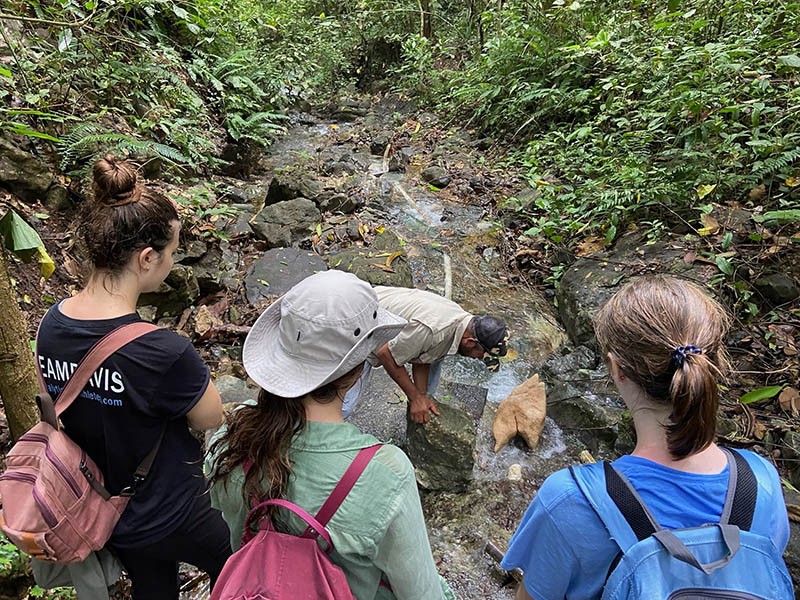Villanova Engineering Service Learning Tackles Projects in Panama and Beyond

From left: Ryan Hodnett ’24 ME, Belen Labarta Galan ’24 CE and Laura Moore ’23 CE watch as a community partner shows them the community’s primary water source along a hiking path.
By Ally Dyer ’23 CLAS
Over fall break, three Villanova Engineering students flew to Panama to check on ongoing work, develop ideas for new projects and connect with community partners in the village of Darien through the Villanova Engineering Service Learning (VESL) program.
VESL maintains decades-long relationships with several international community partners to engage in ethical service and create sustainable engineering solutions. Both undergraduate and graduate students participate in this program through research, internships and classroom seminars. Every year, the VESL program sends groups of students to visit the partner communities and work on a variety of projects.
“The Panama team holds one of Villanova’s longest standing partnerships, dating back to 1991,” said team leader Laura Moore, a senior Civil Engineering major from Leesburg, Va. “I’ve been three times and have been really lucky to be a part of the growth of this program.”
Providing and maintaining a consistent clean water system has been a challenge for the communities of Darien for decades. Villanova has maintained this partnership to aid in finding sustainable solutions. On the fall break trip, the team fixed a device that had been measuring the water flow within the water system in Darien, allowing the community to become immediately aware of leaks in the system. It is important that this information be consistently and readily available to the community and its technicians, as any leak in the system could be detrimental to the community’s ability to distribute clean water in the dry season.
Additionally, the team took GPS points along popular paths for bird-watching tourists. This will allow the team to develop ideas for making the trails more accessible and attractive for tourists from all over the world. An increase in this area of tourism will have a significant positive impact on the community’s economy.
Every project that the VESL program takes on requires students to engage with creative and sustainable solutions, which are often unique to the partner location and community. Several other teams of Engineering students ventured over fall break to foreign countries to pursue this mission, including Ghana, Ecuador and the Dominican Republic. The Madagascar and Cambodia teams plan to travel over winter break.
For the first time, with the Panama team, VESL took on an intern to improve communications about the program and its accomplishments, both internally and externally. I was fortunate to be chosen for this role.
As a Communication student worker for the College of Engineering, I attended VESL classes weekly and worked closely with the Panama team over the past semester in their weekly meetings to understand the history of the partnership and to learn about the team’s current projects. While my primary role on the trip was to collect and curate content through immersion in the field, I often found myself participating in discussions about the projects and contributing thoughts from a non-engineering perspective. I felt particularly comfortable on my team, as all the engineers who traveled were also women. We had a fun synergy in the group that helped us get through every challenge we faced.
As we worked together, I realized that the impact and the importance of the VESL program on the Villanova community and our partner communities has been severely understated. I identified a key communication issue for our team and the VESL program at large: We must find a way to create a shared understanding of this impact throughout the entire Villanova community.
Developing this understanding has become increasingly important for the Panama team since the passing last summer of a key community leader and partner, Father Wally Kasuboski. A priest at a local parish, Father Wally was a driving force for finding clean water solutions in Darien, fixing roadways and providing pastoral care for several communities.
The team has begun building new connections with Father Wally’s successor, Friar Michael. Father Wally’s ambitious “can do” attitude served as a driving force for the progress of their communities and Villanova’s partnership for years. In response, the communities of Darien and their Villanova partners have made it their mission to continue his legacy of building community and continued improvement. Father Wally always found ways to bring people of all walks of life and abilities together to work for the betterment and pursuit of a communal, common good. Sounds very Villanovan, right?
Sharing the impact of VESL’s projects with the greater Villanova community is only the beginning of a greater calling to work together as Villanovans to serve however we can.
